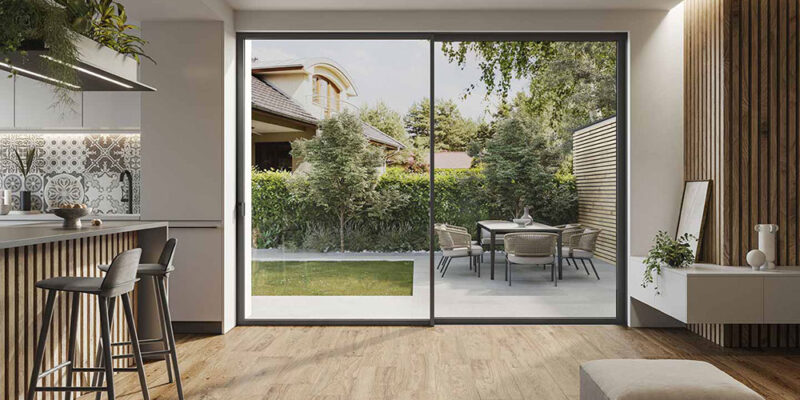When building or renovating a home near the coast, selecting the right type of windows is crucial for aesthetics, durability, and functionality. Coastal properties face unique challenges due to their proximity to salty air, heavy winds, and shifting weather. Among the most popular window styles for these environments are Louver, Casement, and Sliding Windows. Each option offers distinct benefits, but sliding windows stand out as a versatile solution for coastal living. Here’s what you need to know about choosing the right windows for your property.
Challenges of Coastal Living
Before diving into window choices, it’s important to understand the environmental factors that impact windows in coastal areas:
Salt Air Corrosion: Salt can degrade materials over time, especially metals, making it crucial to choose windows with corrosion-resistant frames and hardware.
Heavy Winds: Coastal homes are often exposed to high wind loads, requiring windows designed to withstand strong gusts.
Humidity and Moisture: Excessive humidity leads to potential for mold and mildew, emphasizing the need for windows with proper ventilation.
Taking these factors into account ensures your windows offer longevity and optimal performance.
Popular Window Styles for Coastal Properties
1. Louver Windows
Louver windows, made from parallel rows of glass or other materials, are adjustable to allow air flow while blocking rain.
Advantages: Maximum ventilation and flexibility in controlling airflow, making them ideal for humid environments.
Drawbacks: Limited seal during heavy storms, which may cause drafts or let moisture in.
Best Suited For: Tropical regions with mild coastal climates but fewer storm threats.
2. Casement Windows
Aluminum casement windows are hinged on one side and swing outward or inward for operation.
Advantages: Excellent seal against wind and rain, providing top-notch energy efficiency and protection. Their outward-opening mechanism can act as a wind deflector.
Drawbacks: The hinges and hardware may be prone to salt corrosion unless upgraded materials are used, requiring regular maintenance.
Best Suited For: High-wind areas where durability and resistance to weather are priorities.
3. Sliding Windows
Aluminum sliding windows consist of two or more panels, where one panel glides horizontally to open and close. They are well-loved for their simplicity and modern look. Let’s dive deeper into why they are an excellent choice for coastal properties.
Why Choose Sliding Windows for Coastal Properties?
Sliding windows strike the perfect balance between form and function for homes near the coast. Their unique design provides several advantages:
1. Durability Against Coastal Elements
Sliding windows typically feature fewer moving parts compared to casement and Louver windows, meaning less wear and tear over time. Many sliding windows are made with frames of vinyl, fiberglass, or aluminum, materials that offer superior corrosion resistance for the salty coastal air. Additionally, modern sliding windows can be paired with impact-resistant glass, making them more resilient during storms.
2. Space-Saving Design
Unlike casement windows, which swing outward or inward, sliding windows operate horizontally along a track. This feature is especially ideal for homes with limited exterior space, such as those with decks or patios, as it eliminates the need for clearance to open and close.
3. Efficient Ventilation
While sliding windows might not offer the same level of ventilation as Louver windows, they still allow plenty of fresh air into your home. You can easily adjust the panels to control airflow – perfect for regulating humidity levels during humid days.
4. Easy Maintenance
Sliding windows are incredibly easy to clean and maintain. Coastal properties often accumulate dirt, sand, or salt residue on window frames, but sliding windows can be quickly wiped down thanks to their accessible design. High-quality tracks and rollers also ensure smooth operation even in damp conditions.
5. Modern and Versatile Aesthetics
Sliding windows have a sleek, contemporary design that complements the airy, open vibe of coastal homes. Available in a wide range of sizes and finishes, these windows can seamlessly fit into modern architectures or even traditional beach houses.
Tips for Installing Sliding Windows in Coastal Properties
To maximize the benefits of sliding windows near the coast, consider the following:
Choose Corrosion-Resistant Materials: Opt for frames made of vinyl, fiberglass, or coastal-grade aluminum, and ensure all hardware, like rollers and locks, are corrosion-resistant.
Upgrade to Impact-Resistant Glass: Coastal areas are prone to strong storms; investing in reinforced glass ensures safety and longevity.
Ensure Proper Seals: Look for sliding windows with weatherproof seals to limit drafts and prevent moisture intrusion.
Prioritize Regular Maintenance: Clean tracks and check seals periodically to prevent wear from humidity or salt exposure.
When selecting windows for a coastal property, it’s essential to balance durability, ventilation, and aesthetics. While Louver and casement windows offer distinct advantages, sliding windows emerge as a practical and stylish choice that meets the challenges of coastal environments. Their space-saving design, corrosion-resistant materials, and modern appeal make them ideal for homeowners who want both functionality and beauty.








Comments